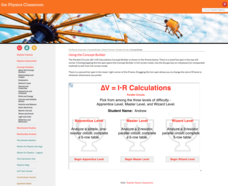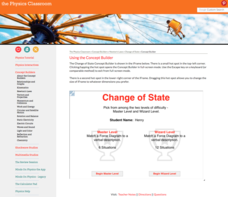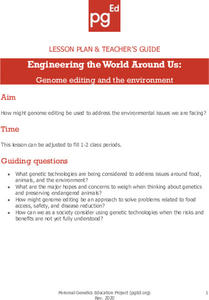Colorado State University
What Is a "Convection Cell"?
Round and round in circles it goes! A hands-on activity has learners recreate a model of a convection cell. They watch as the difference in density of their materials creates a current.
Howard Hughes Medical Institute
Niche Partitioning and DNA Metabarcoding
What is DNA metabarcoding? Show your biology class the latest method for studying biodiversity in an ecosystem with a fun, informative interactive. Individuals examine the animal species that compete for vegetation, then learn how their...
US Institute of Peace
Defining Conflict
Before there can be peace, we have to understand conflict. Introduce the concept of conflict through a two-part activity that combines discussion, collaboration, and writing. The first in a 15-part series examines the multiple meanings...
Physics Classroom
Position-Time Graphs - Conceptual Analysis
Increasingly, colleges and employers want applicants with strong conceptual analysis skills, so give them some practice! Applying these skills to position-time graphs encourages synthesis of knowledge. To complete an installment of a...
Physics Classroom
Parallel Circuits - ∆V = I•R Calculations
Parallel circuits often provide less of a challenge for teens than parallel parking. An installment of a series on parallel electric circuits requires learners to solve increasingly difficult levels of calculations. Each level...
Physics Classroom
Match That Graph
Matchy-matchy no longer exclusively applies to fashion. Scholars work through three levels of practice matching position and velocity graphs. Part of a series covering dimensional kinematics, each question provides immediate feedback and...
Physics Classroom
Dots and Graphs
Scholars demonstrate understanding of kinematic graphs through matching dot graphs to position time graphs, dot graphs to velocity graphs, and a mixture of the two. If users feel stuck or confused, a Help Me! button offers an explanation...
Physics Classroom
Change of State
Free-body diagrams display all forces acting on an object, helping scientists represent Newton's Laws of Motion. Scholars read a short description of motion and view the free-body diagram to begin the installment of a larger series on...
Physics Classroom
Match That Free-Body Diagram
Pupils read a description of a physical situation and select the free-body diagram that best matches. As part of a series on applying Newton's Laws of Motion, scholars reinforce their skills applying forces and considering their relative...
Physics Classroom
Up And Down
Many scholars confuse velocity and acceleration even after they correctly solve basic problems. Using an interactive, part of a series on vectors and projectiles, with immediate feedback focuses their attention on the up or down...
Magic of Physics
Shadows
Sunrise, sunset ... swiftly move the shadows! Pupils practice comparing shadow length data with a hands-on activity. The resource allows users to examine and measure the shadow cast by a stick as the sun moves overhead before testing...
K12 Reader
Little Men: Starting School
Jo March is all grown up in Louisa May Alcott's Little Men, and a new generation of children is benefitting from her tutelage. Young learners read a passage from the novel before answering four comprehension questions about plot details...
Concord Consortium
Cheetah's Lunch
Run like a cheetah. A performance task challenges pupils to solve several different problems involving the speed of a cheetah. Given information for scenarios where the cheetah chases its prey, they determine if the big cat is fast enough.
Serendip
Molecular Biology Vocabulary Review Game
Getting bored with the typical review strategies? Why not turn it into a game! Learners practice their DNA vocabulary by trying to get their partner to guess the word they're describing. To complicate things a bit, there are words that...
PBS
KidVid: Equivalent Ratios
There's no equivalent to this interactive. To learn about equivalent ratios, scholars first watch a video of a pupil trying to find an equivalent ratio. They consider whether the pupil is correct and explain their reasoning. Then, they...
Science Matters
Electromagnets
Classes are sure to get all wrapped up in an attractive lesson! Young scientists learn how to combine electricity and magnetism as they create electromagnets. They create their own electromagnets and collect data on their strength...
American Museum of Natural History
All About Cloning
Start seeing double. The American Museum of Natural History website provides pupils with information about Dolly, the cloned sheep. Learners find out the procedure used to create Dolly along with why scientists clone animals.
American Museum of Natural History
Planetary Mysteries
Get to know our little part of the vast universe. Learners read about the common and not-so-common facts about each of the planets in the solar system. The interactive lesson includes a large amount of information as well as a quiz to...
National Endowment for the Humanities
Treaty Negotiations
Let's make a deal! Drawing on work in previous unit lessons, young scholars negotiate favorable trade treaties with other nations during the early Modern Empire Era. Their work relies on previously completed activities, as well as...
Smithsonian Institution
Vaccines! How Can We Use Science to Help Our Community Make Decisions about Vaccines?
Uncover the fascinating world of vaccines in a multifaceted activity. Investigators explore community perception and the science of vaccines with eight tasks. Scientists continue their studies by giving and reviewing surveys, analyzing...
Bonneville
Renewable Energy Panel
Plan a panel on public policy. On the first day of lessons, scholars identify local government planners and create questions to ask regarding renewable energy and infrastructure. On the second day, they conduct the panel and learn about...
Personal Genetics Education Project
Reproductive Genetic Testing: Technology, Access, and Decision Making
Explore the complexities of reproductive genetic testing respectfully in the learning space. Scientists read articles, view a slideshow, and complete a do-now about genetic technologies. A fishbowl activity allows scholars to discuss the...
Personal Genetics Education Project
Engineering the World Around Us: Genome Editing and the Environment
Challenge young minds to build a better world with genetic engineering. Biologists learn potential solutions for environmental issues using genome editing while interacting with three case studies. Scholars read articles and view...
C3 Teachers
Economics of Slavery: How Did Cotton Sow the Seeds of Panic?
An inquiry-based lesson challenges high schoolers to research and identify the economic forces and inventions that impacted the cotton industry. Researchers consider how the use of slavery impacted the economic growth of the United States.

























